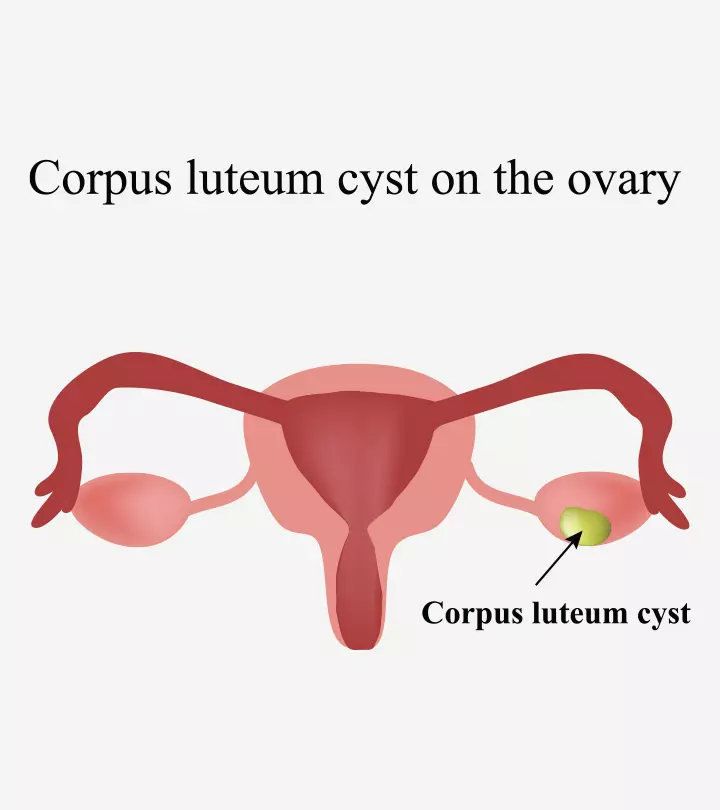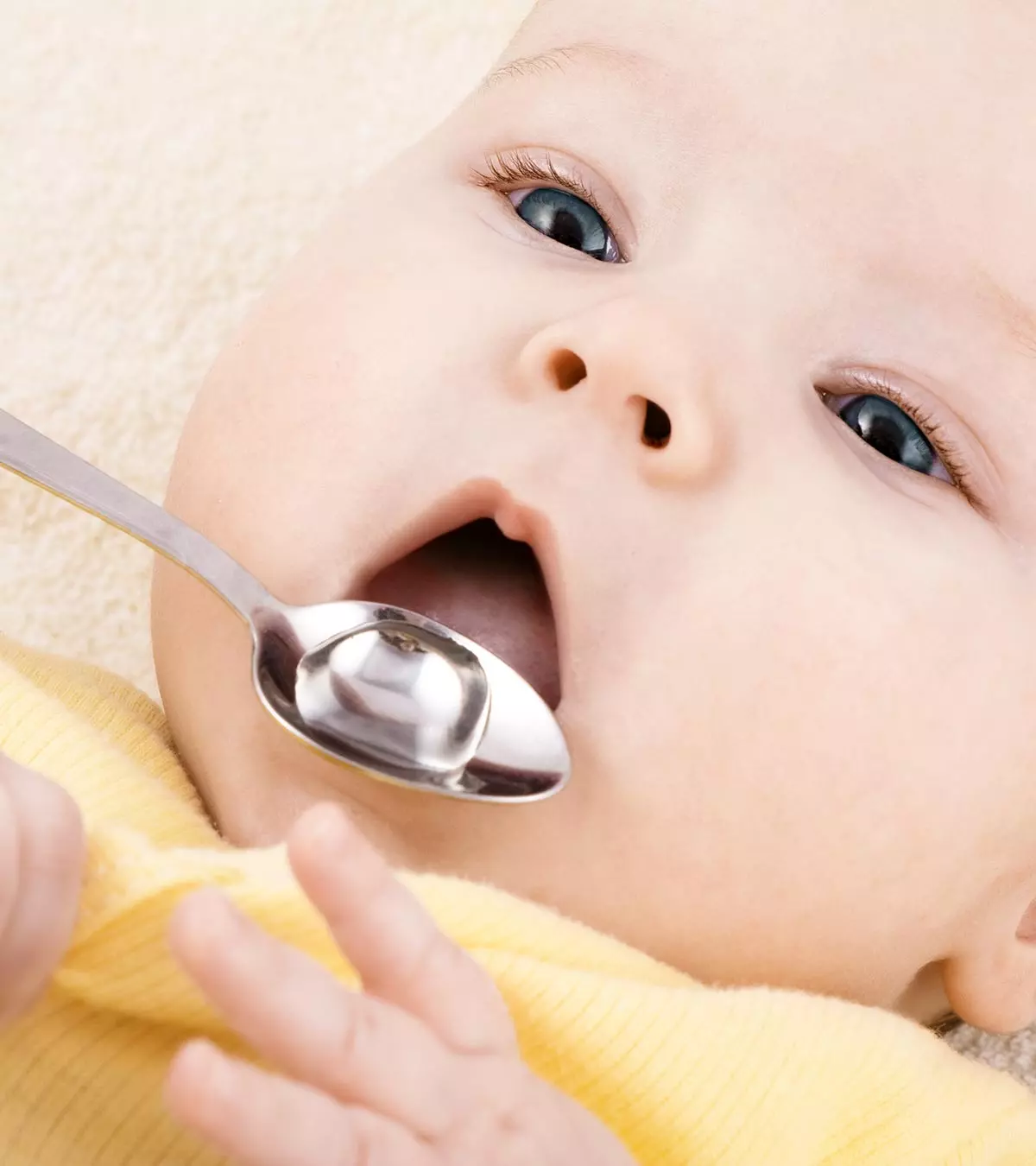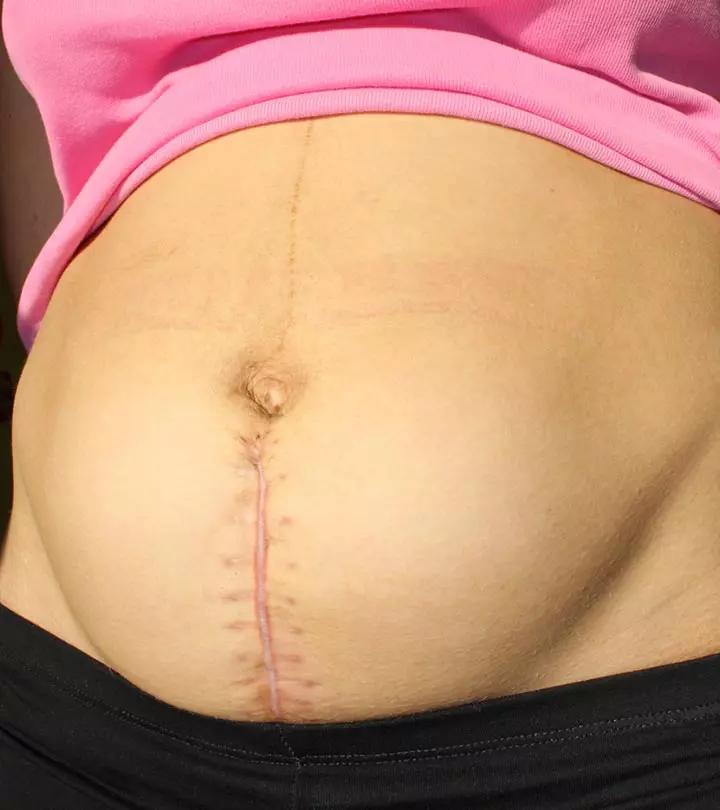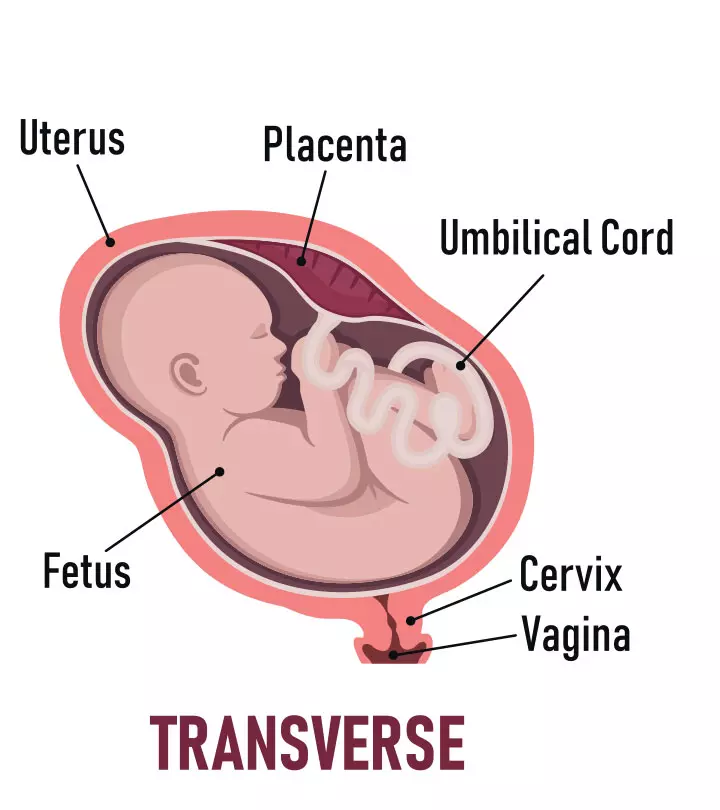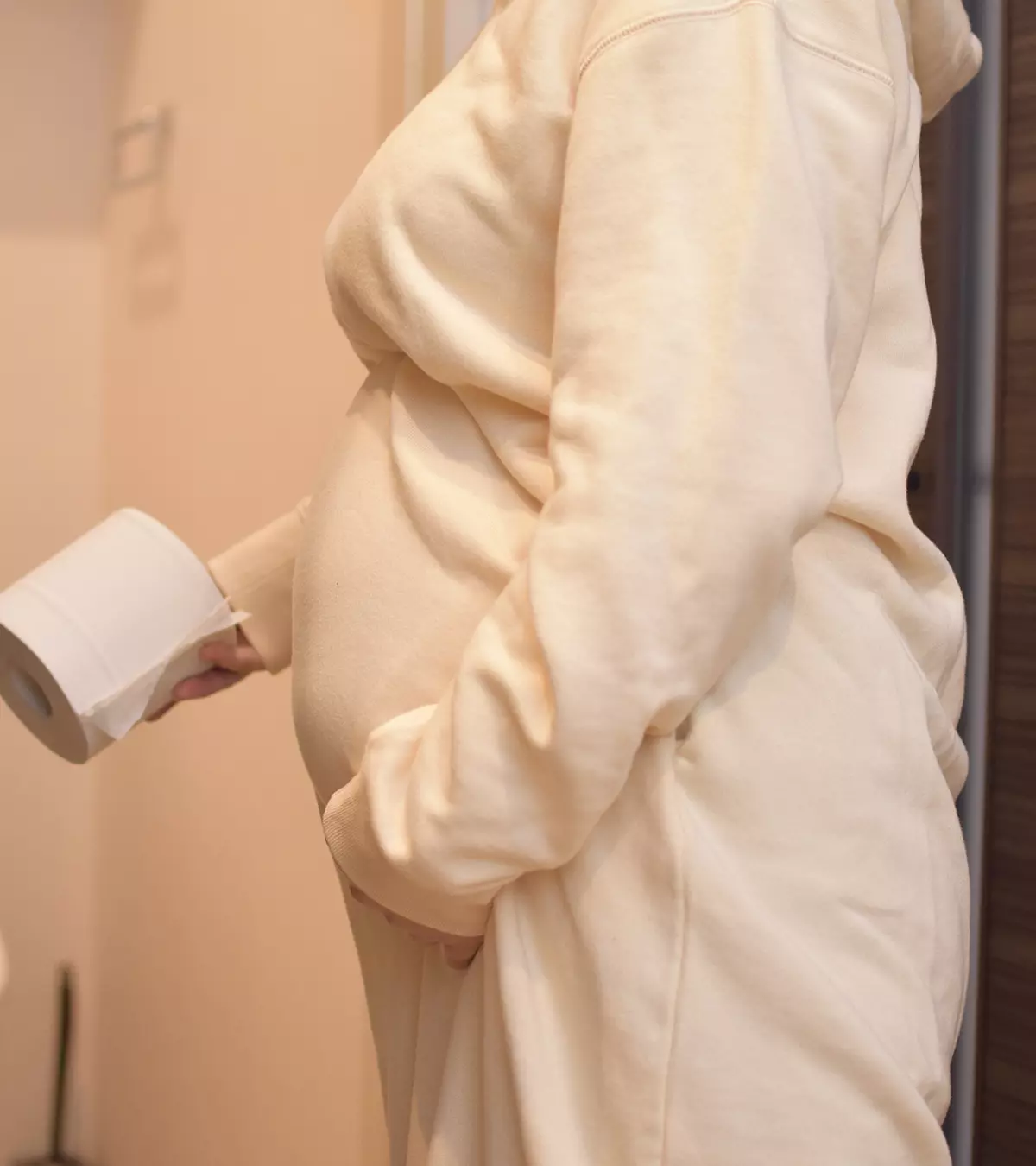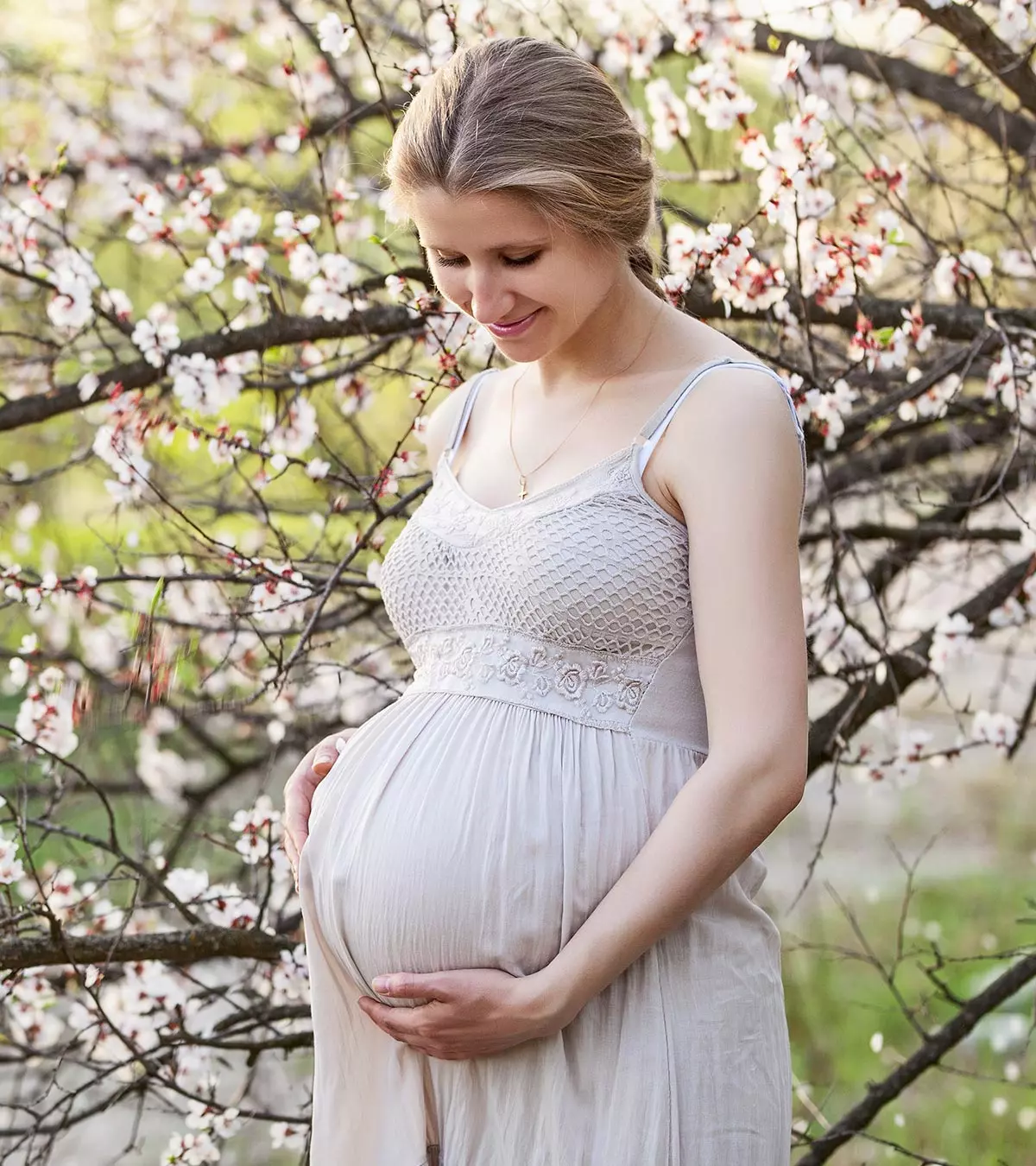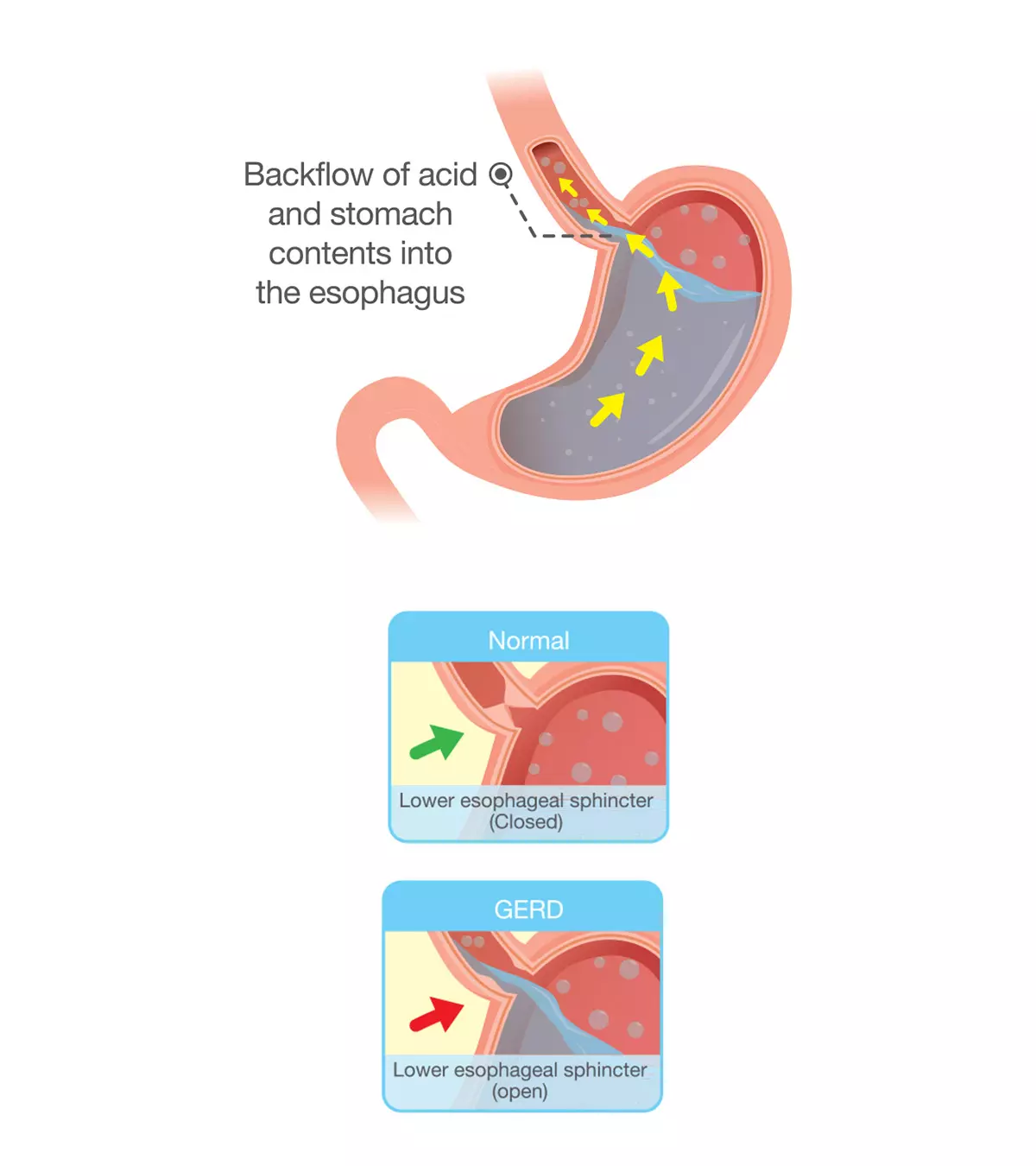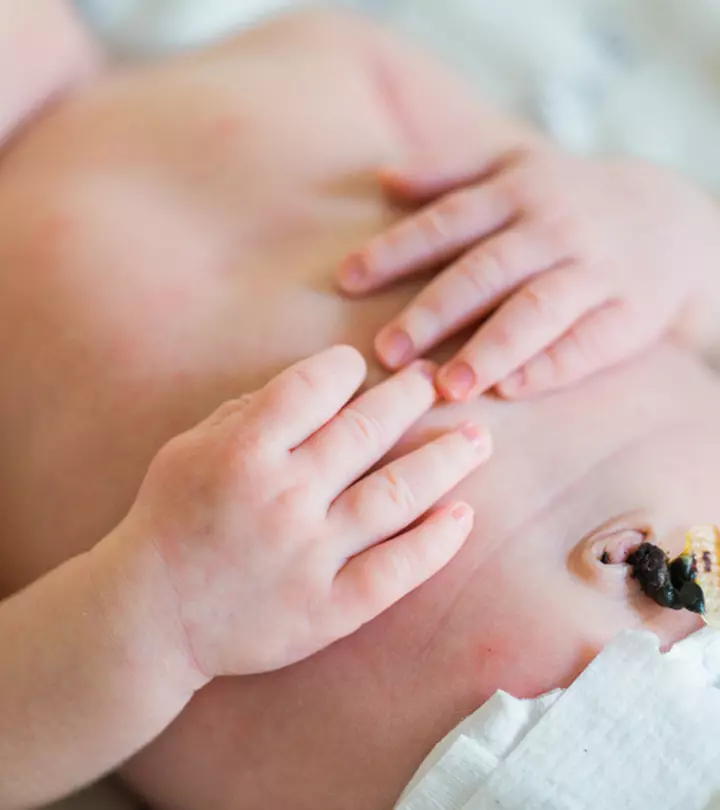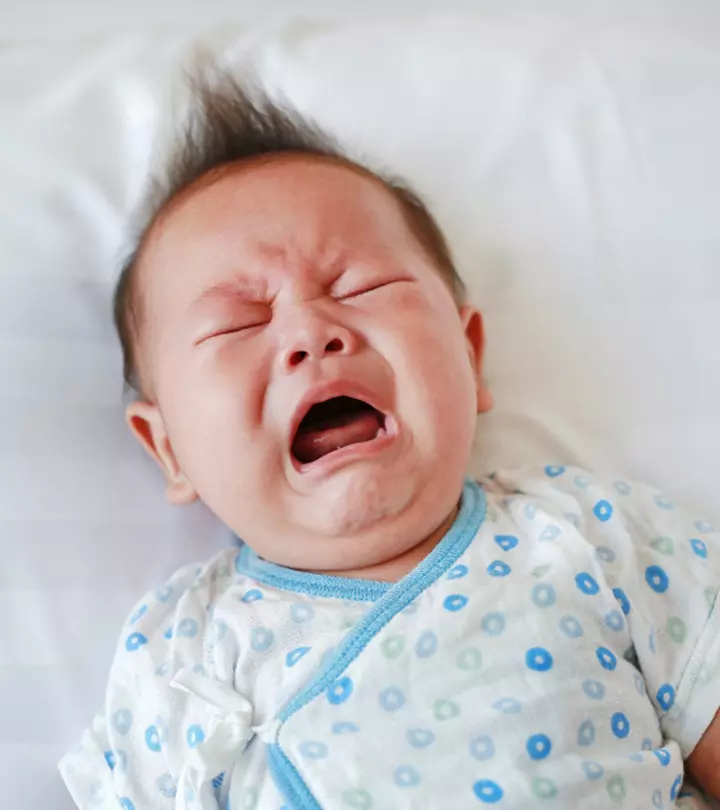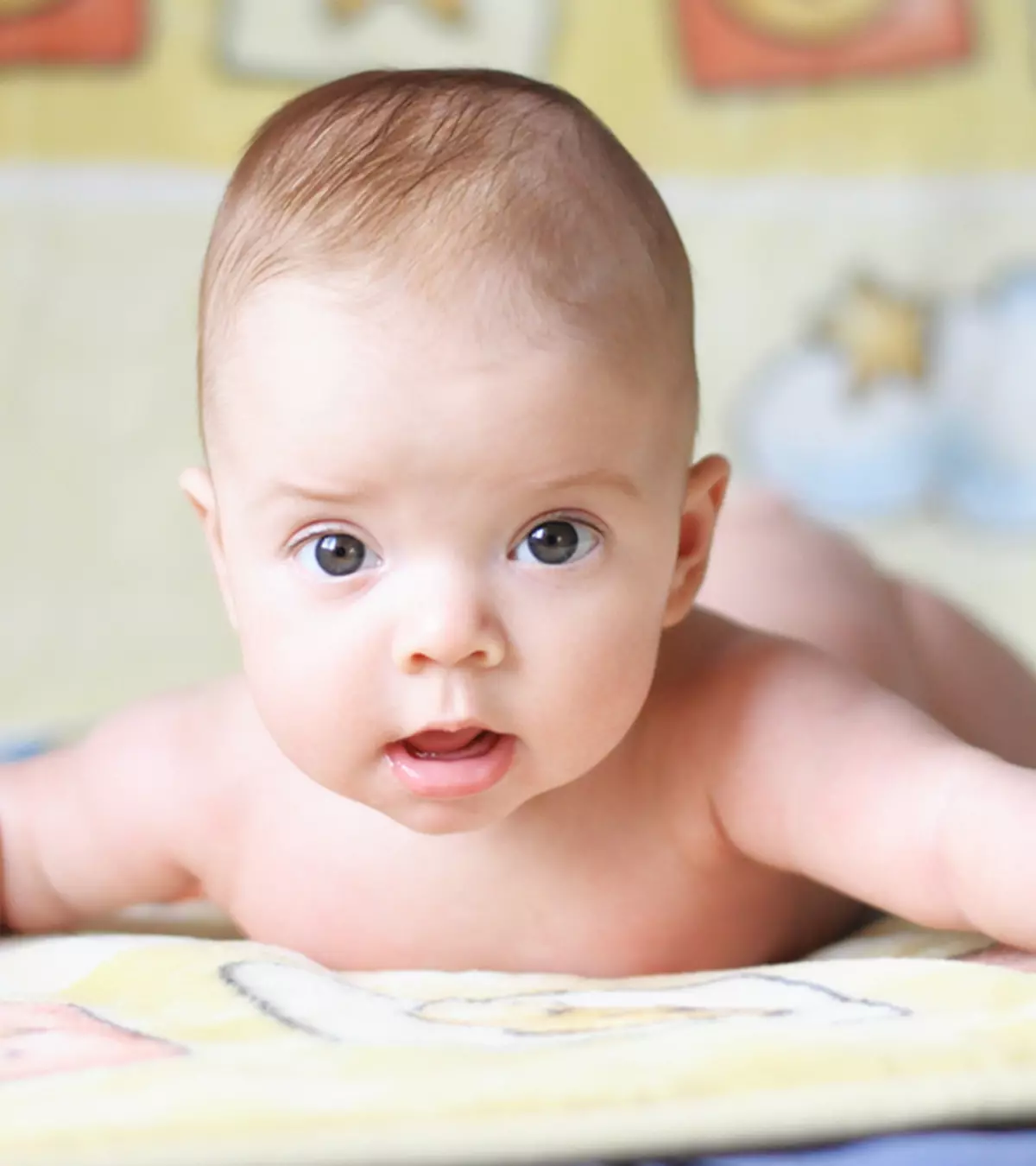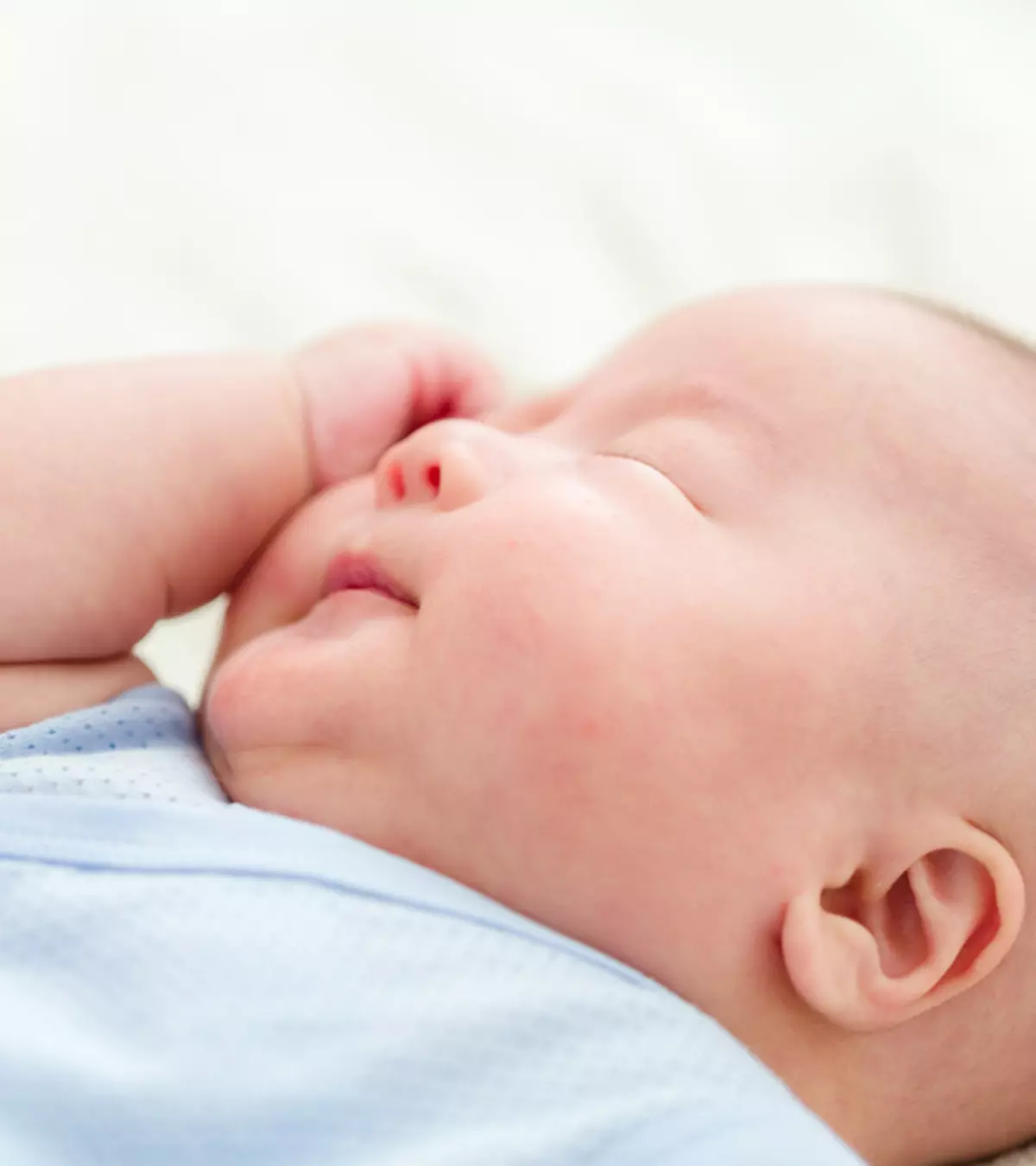
Image: ShutterStock
If you have noticed scratch marks on your baby’s face, it is quite understandable to feel upset or anxious. However, these marks have likely been caused by your baby scratching their own face. Nevertheless, parents should be wary about babies scratching themselves. Knowing the potential reasons for scratching can ease parental concerns and help prevent it. Scratch marks on babies’ faces are common due to their sensitive skin. Even activities such as bathing and massaging may cause you to accidentally scratch their delicate skin. This post discusses the various reasons babies scratch their faces and ways to prevent scratch marks and skin infections caused by scratching.

Key Pointers
- Babies may scratch their faces when they are upset, exploring themselves, or due to Moro reflex.
- Skin conditions such as eczema and dry skin may also cause irritation or itching on the face, making them scratch.
- Moisturizing, keeping nails trim, and covering hands with gloves can prevent them from scratching faces.
Why Do Babies Scratch Their Face?
Babies have delicate skin, so a small bump or a scratch may look painful. While these scratches are not the cause of concern in most cases, learning about several reasons that may lead to a baby scratching face can help parents relax and manage these scratches effectively.
Some of the common reasons why a baby scratches their face include:
- Exploring face

According to research, touching one’s face is an instinct that babies develop in utero. Nyaz Didehbani, a UT Southwestern Medical Center psychiatrist, says, “Some research suggests it is a sign of healthy development. It is also the first sign of sensory nerves developing in the face.” Exploring one’s body and the desire to sense new sensations could make a baby touch their face and scratch it accidentally. It could be the reason for scratch marks on the baby’s face when no other apparent reasons are present (1).
- Moro reflex
Newborns do not have adequate control of most body movements until they are a few weeks old (2). It is when reflexes come into use. Moro reflex in babies, also known as the startle reflex, is an involuntary response wherein a baby arches their back and throws their arms, legs, and neck in response to a sudden movement or loud noise. It is during this involuntary reflex that a baby may touch their face and scratch it accidentally.
- Sharp nails

Although babies have thin nails, they grow pretty fast. Sometimes, you may need to trim them twice a week (3). If you forget to upkeep, a baby may accidentally scratch themselves at any time.
- Dry skin
Babies have thin and permeable skin susceptible to moisture loss. Bathing the baby too often, using harsh soap, applying baby talc, and prolonged exposure to hot or cold weather conditions with low humidity can degrade their skin barrier, causing moisture loss (4). Baby’s dry skin and flakiness can be a result of moisture loss, which also causes itchiness and irritation.
- Upset baby

Sometimes, when a baby is upset, they may accidentally scratch their nose, forehead, or scalp, as they cannot express themselves conventionally.
- Skin conditions
Sometimes, your baby may also scratch their face because of itchiness caused by various skin diseases. Atopic dermatitis, eczema, miliaria (prickly heat or baby heat rash), and scabies in babies are some common skin conditions that cause itchy skin rashes (5). Eczema, in particular, is most prevalent among babies. According to the American Academy of Dermatology Association, 25% of children have eczema globally, and about 60% of these children have developed eczema during their first year of life (11). These rashes may irritate the baby and cause them to scratch their skin often. The itchiness due to these skin conditions resolves or alleviates once the treatment begins.
 Quick fact
Quick factWhen Do Babies Stop Scratching Their Face?
Dr. Sonia Cajigal, a board-certified allergist and immunologist from Greater St. Louis, says, “Babies generally stop scratching their face after they are six months old and have better motor control. If they’re scratching due to eczema or itchy skin (eczema affects the cheeks in infancy), it tends to diminish after two.”
Based on the cause, a baby may cease scratching their face within a few weeks after birth or take a little longer. For instance, scratching the face due to uncontrolled movements may end once the baby has better control of their muscles and body movements. Treating skin conditions can stop scratching or may alleviate it to a significant extent.
In most cases, a baby scratching their face is a temporary issue and seldom causes scarring. However, if the scratching persists or worsens, consult a pediatrician. Sustained scratching might cause deep grooves and soreness which may make the baby’s skin susceptible to infections.
 Did you know?
Did you know?How To Prevent Babies From Scratching Their Face?
From sharp nails to dry skin due to weather conditions or uncontrolled movements while exploring their face, a baby may scratch their face for several reasons. You can prevent them from scratching their face by identifying and avoiding these potential triggers. Here are some tips that you could try:
- Skin moisturization: Apply a gentle, unscented moisturizing lotion twice a day to retain and add moisture to the skin. You can also prevent skin dryness by limiting your baby’s bath time, avoiding harsh soaps, and dressing them in clothes made of light fabrics. Adequate skin moisturization can help avoid dryness-related scratching to a great extent. If your baby’s skin is overly sensitive, try replacing the soap with a mild baby bath gel. Powders, even baby talcs, may be avoided. Limiting your baby’s bath time or giving them a lukewarm bath, avoiding harsh soaps, and dressing them in clothes made of light cotton fabrics are some other ways to care for their delicate skin (12).
Dr. Cajigal suggests, “The best topical preparations for the face are fragrance-free creams and ointments (for example, CeraVe, Vaseline), as these will help the skin retain moisture. Lotions are fine but have higher water content and do not absorb into the skin well.”
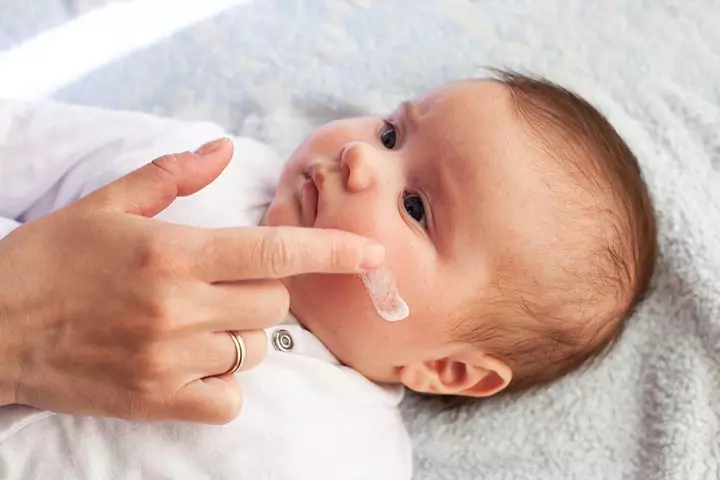
- Nail trimming: Timely nail trimming or clipping can prevent accidental scratching of the face. Calm moments, such as when the baby is sleeping or feeding, are the best times to cut their nails. You can use a baby nail clipper to trim or an emery board to file your baby’s nails (6). A baby nail cutting scissors is also a good option. Choose the instrument you are most comfortable with. Stay calm while trimming or filing your baby’s nails to prevent accidental cutting and nipping that may cause damage to the skin around the nails.
- Covering hands: Swaddling wraps your baby’s hands and is a suitable way to prevent accidental scratching of the face due to uncontrolled movements. Alternatively, you can use soft mittens or socks to cover the baby’s hands (6). Remove strings or any other accessory attached to mittens or socks to avoid accidental choking. The use of mittens is common; however, some experts feel that they are not needed if you trim or file the nails on time (7). Stay-on scratch sleeves are another option to check with your doctor if mittens aren’t helping much.
Talking about the benefits of mittens for her baby, Melody, a mother and blogger, says, “Baby mittens aren’t just for winter! They keep baby Cole (her baby) from scratching his face with his quick-growing fingernails… Cole also loves chewing on his fingers and chewing on fabric, and this way, he gets to do both at the same time! (i)” - Treating skin issues: If your baby has a skin problem, treating it is the best solution to prevent scratching. While you can try over-the-counter options to alleviate skin dryness, consulting a doctor to treat a skin condition is advisable. Prompt treatment is vital to protect your baby’s skin from further damage that might happen due to skin infections.
- Ensure your baby is not unduly uncomfortable: Look for signs of hunger and feed before they make the baby distinctly cranky. The American Academy of Pediatrics (AAP) recommends keeping a diary or track record of the baby’s feeding schedule and looking out for any hunger clues, like lip-smacking or fists in mouth (13). Additionally, take care of other things bugging the baby like hot or cold surroundings, feeling drowsy but inability to self-soothe. As you gain experience, you will be able to pick up these cues earlier.
- Create a soothing routine: Set up a calm environment for your baby before bedtime or during moments of fussiness or irritability. Gentle rocking, swaddling, or playing soft music (white noise) can help ease anxiety and reduce the chances of scratching. You may also offer breastmilk or try giving them a pacifier to calm them down, as sucking helps them relax (13).
Besides these interventions, maintain a steady baby’s room temperature, especially during winter, when most households use heaters. Heaters reduce humidity, making a baby’s skin dry and triggering itchiness, which can lead to scratching. Also, monitor your baby’s skin for irritation or scratches, especially after play or sleep, to catch issues early and reduce infection risk.
 Point to consider
Point to considerHow To Treat Scratches?
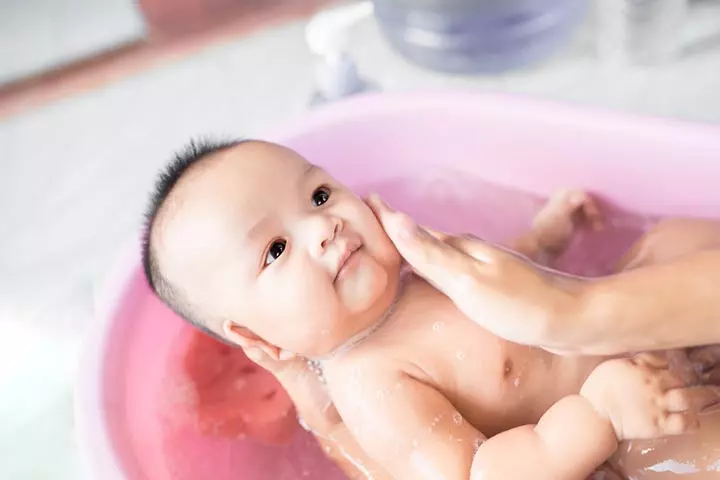
While preventing scratching is best, it is good to learn some tips to care for scratches already present.
- Gently clean the scratches as soon as you notice them. Use lukewarm water and antibacterial soap to clean the area.
- Pat the area dry and apply gentle, unscented moisturizer or antiseptic cream.
- Leave deeper scratches open to heal. Keep the scratches moist with antibacterial creams or ointments that can act as a barrier against germs.
- Trim your baby’s nails and cover their hands with mittens to ensure the baby doesn’t scratch their face further.
- Consult a pediatrician if your baby has any skin condition like eczema. The doctor may prescribe a hydrocortisone cream or an oral antihistamine medication, such as diphenhydramine (Benadryl), to relieve itchiness. These medications may have some side effects, but they rarely occur.
Frequently Asked Questions
1. Can I use Vaseline on my baby’s face?
As unscented petroleum jelly (Vaseline) is a good moisturizer for babies (10) so you may apply it on their skin. However, it is advisable to check with your doctor if you spot rashes or sores on the baby’s skin after using Vaseline.
2. Do teething babies rub their faces?
No scientific evidence proves that babies rub their faces when they are teething. But teething babies drool, and it might cause them discomfort leading them to rub or scratch their faces.
3. What should I do if my baby’s scratched area starts to bleed?
You may clean the area and treat it with a gentle moisturizer or an antiseptic cream. If the cut or abrasion is severe, take your baby to the doctor to get the necessary treatments.
Babies scratching their faces is a common occurrence either due to moro reflex or other reasons, including dry skin and sharp nails. However, it is important to follow certain preventative measures to ensure that they prevent the baby from scratching their faces. By keeping your baby’s skin moisturized, making them wear mittens, and trimming their nails short, one can likely prevent these scratches from occurring. In addition, based on the cause of the scratching, it may subside on its own eventually as the child gains more control over their muscles and movements.
Infographic: When Should You Worry About Your Baby’s Face Scratching?
Face scratching may be common, and, in most cases, babies outgrow this behavior. However, you must be mindful of specific indications of when it can become concerning and harmful for your baby. This infographic will help you understand those signs to take appropriate and timely steps.
Some thing wrong with infographic shortcode. please verify shortcode syntax
Illustration: Reasons Why Baby Scratches Face And Tips To Prevent It
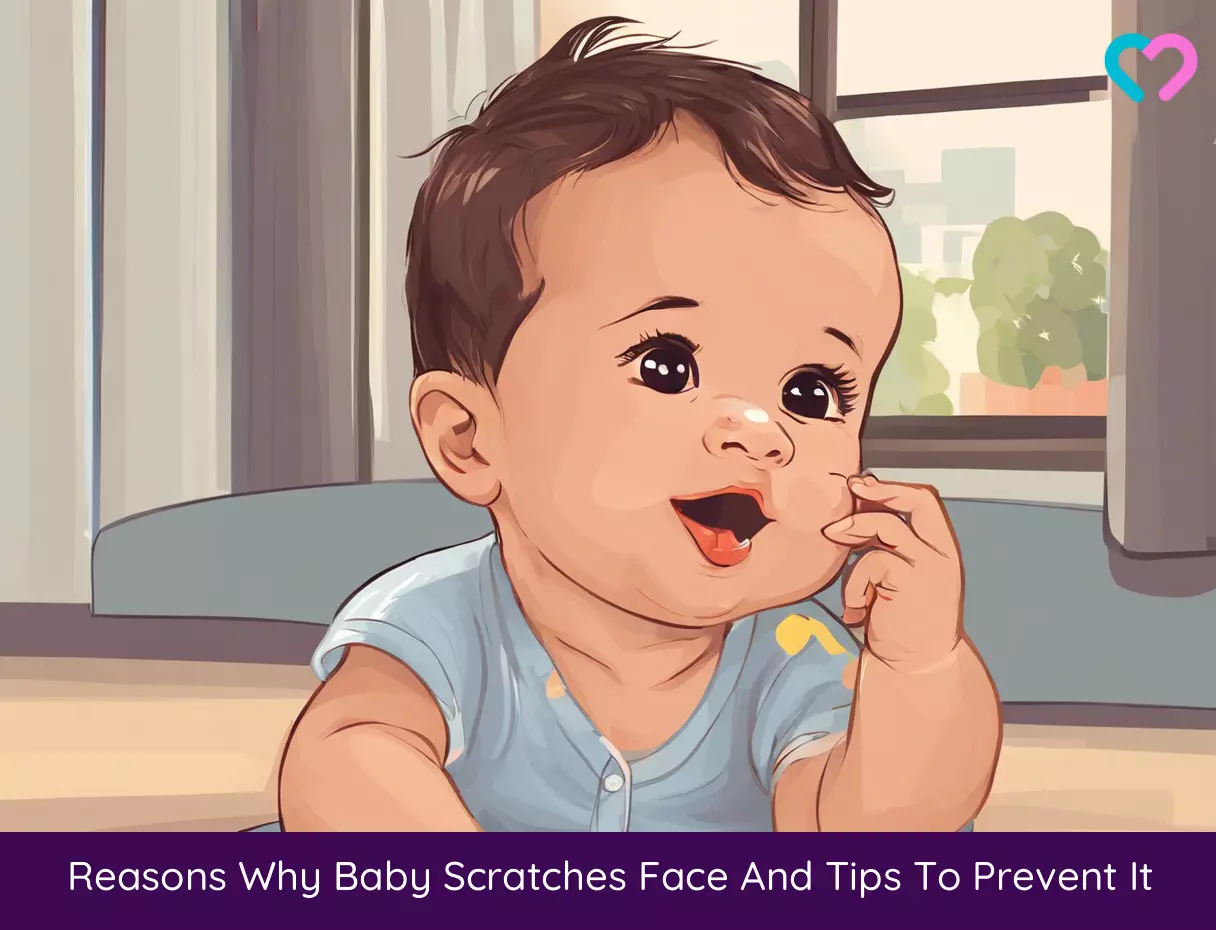
Image: Stable Diffusion/MomJunction Design Team
Personal Experience: Source
MomJunction articles include first-hand experiences to provide you with better insights through real-life narratives. Here are the sources of personal accounts referenced in this article.
i. Tutorial- Baby Mittens;
http://treasuresunderthewillowtree.blogspot.com/2012/04/tutorial-newborn-mittens.html
References
Community Experiences
Join the conversation and become a part of our nurturing community! Share your stories, experiences, and insights to connect with fellow parents.
Read full bio of Dr. Pooja Parikh
- Dr. Sonia Cajigal is a board-certified allergist/ immunologist, practicing for seven years. She attended medical school at the University of Missouri-Kansas City School of Medicine and trained around the midwest (Kansas City, Cleveland, Detroit) before settling down back in her hometown of St. Louis, Missouri where she started her own practice.
 Dr. Sonia Cajigal is a board-certified allergist/ immunologist, practicing for seven years. She attended medical school at the University of Missouri-Kansas City School of Medicine and trained around the midwest (Kansas City, Cleveland, Detroit) before settling down back in her hometown of St. Louis, Missouri where she started her own practice.
Dr. Sonia Cajigal is a board-certified allergist/ immunologist, practicing for seven years. She attended medical school at the University of Missouri-Kansas City School of Medicine and trained around the midwest (Kansas City, Cleveland, Detroit) before settling down back in her hometown of St. Louis, Missouri where she started her own practice.
Read full bio of Swati Patwal
Read full bio of Rohit Garoo
Read full bio of Vidya Tadapatri







